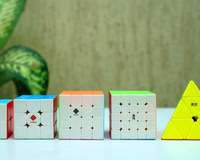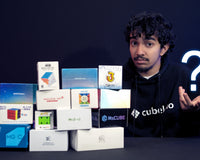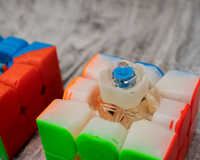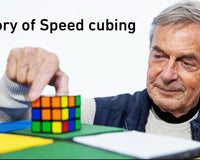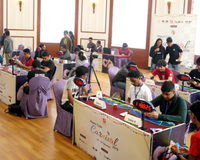Introduction
In today’s world, parents and educators are increasingly aware of the vital role that play has in supporting a child’s cognitive development. Cognitive development refers to the growth of a child’s ability to think, reason, and solve problems, and the right toys can nurture these skills from an early age.
Engaging children with toys that challenge their minds and encourage them to explore new concepts can have long-lasting benefits for their intellectual growth. Among the best toys for promoting cognitive skills are Rubik’s Cubes, stackers, and a wide variety of board games.
The Importance of Cognitive Development in Early Childhood
The early years are critical for brain development, with children acquiring essential skills like problem-solving, memory, and reasoning. Through play, children develop the foundations they need for academic success and life skills. Toys designed to challenge cognitive abilities help children engage their minds in fun, interactive ways, fostering creativity, logical thinking, and attention to detail. Whether your child is playing with a Rubik’s Cube or enjoying a board game, each experience adds to their cognitive toolkit.
1. The Rubik's Cube: A Puzzle for Critical Thinkers
The Rubik’s Cube is more than just a fun challenge—it's a powerful tool for cognitive development. Solving a Rubik's Cube requires strategic thinking, pattern recognition, and memory recall. The cube presents children with a complex, multi-faceted puzzle, making it an excellent way to encourage logical reasoning and problem-solving skills.

Learning how to solve a Rubik’s Cube teaches children patience and persistence, as they must focus on understanding the puzzle’s mechanics and practice various methods to complete it successfully. It also improves spatial awareness as kids visualize different moves and their outcomes. As children advance in their solving techniques, they begin to develop a stronger memory, as many strategies require recalling a series of steps and algorithms.
Rubik’s Cubes are suitable for older children and teens, making them a popular toy that continues to challenge cognitive abilities over time. For younger children, simpler twist-and-turn puzzles can serve as an introductory step to this world of logical reasoning.
2. Stackers: A Simple Toy with Complex Benefits
Stacking toys, like Wooden Stone Building Blocks, often referred to as stackers, may seem basic at first glance, but they offer tremendous cognitive benefits for toddlers and young children. These toys are designed to improve hand-eye coordination, motor skills, and early problem-solving abilities.

When a child plays with stackers, they’re learning about balance, size comparison, and spatial awareness. They must figure out how to arrange pieces to build a stable tower, which requires trial and error—a key component of early problem-solving. This encourages children to think critically about their actions and adjust them based on the outcome.
Stackers are perfect for younger children, as they are visually engaging and often come in bright colors, making them appealing to toddlers. In addition to developing cognitive skills, stackers also strengthen a child’s fine motor skills, as they need to grasp and carefully place each piece in the correct order.
3. Board Games: Building Strategy and Social Skills
Board games provide children with opportunities to develop both cognitive and social skills. Whether playing simple games more complex ones like chess, children must learn to plan ahead, strategize, and adapt to new challenges. Board games also teach the importance of following rules, taking turns, and thinking critically about each move.
Strategic games, such as chess or Settlers of Catan, are especially effective in boosting higher-order thinking skills. Players must anticipate their opponents’ moves and adjust their strategies accordingly, encouraging long-term planning and foresight. For younger children, games like Snakes and Ladders or memory games enhance recall abilities and foster concentration.

In addition to improving cognitive abilities, board games provide opportunities for social interaction, where children learn about teamwork, patience, and communication. These games are ideal for family time, as they foster bonding and collective problem-solving.
4. Shape Sorters and Puzzles: Early Problem-Solving
Shape sorters and puzzles are fantastic toys for engaging young minds in problem-solving. By figuring out how to match shapes or assemble pieces, children learn to recognize patterns and improve their spatial reasoning. These types of toys also promote fine motor skills and hand-eye coordination, as children manipulate pieces into place.

Puzzles encourage children to use logical thinking to fit pieces together, while shape sorters allow them to experiment with size and dimensions. Both types of toys are excellent for building foundational cognitive skills that will benefit children as they grow.
Choosing the Right Toy for Your Child’s Cognitive Development
It’s important to select toys that match your child’s developmental stage. For toddlers, toys like stackers and shape sorters provide the perfect balance of challenge and engagement. As children grow older, they can graduate to more complex puzzles, memory games, and strategy-based board games. The Rubik’s Cube, for instance, is ideal for older children who are ready to tackle more advanced problem-solving tasks.
Conclusion
From Rubik’s Cubes to board games and stackers, toys are a fantastic way to enhance a child’s cognitive development. Each toy serves a unique purpose in helping children develop critical skills such as logical reasoning, spatial awareness, and problem-solving.
These toys provide fun and engaging ways for kids to grow intellectually while sparking curiosity and creativity. Whether it’s the simplicity of stacking or the challenge of solving a Rubik’s Cube, these activities lay the foundation for a lifetime of learning.
So, next time you’re picking a toy, consider one that will not only entertain but also challenge your child’s mind, helping them to think, grow, and thrive.

















